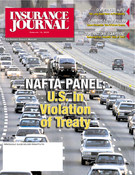The Comptroller of Public Accounts in Texas is planning an appeal of a Third District Court ruling that found Dow Chemical Co. did not owe the comptroller taxes on independently procured insurance. The Comptroller’s move ultimately attempts to overturn a 40-year-old Supreme Court decision upon which the Third Court based its recent decision. Should that appeal be found in favor of Dow, it could have interesting national ramifications on surplus lines brokers.
Independently procured insurance refers to coverage purchased by a company owning personal property in one state and insuring it through an out-of-state company not authorized to sell insurance in that state. Texas, along with numerous other states, imposes a tax on such purchases.
The case against the comptroller’s office began after the office audited Dow for the period between Jan. 1, 1991 and Dec. 31, 1997. As a result of the audit, the comptroller assessed Dow $427,148 for taxes on the independently procured insurance plus penalties and interest. Dow paid the assessment under protest and filed suit in the 250th Judicial District Court seeking a refund. That court originally found in favor of the comptroller, but Dow appealed to the Third District Court, which found on Jan. 25 in favor of the chemical company.
The court determined that the case virtually mirrored one decided in the U.S. Supreme Court in 1960 in which the Texas Board of Insurance sued Todd Shipyards Corp. In that case, the Supreme Court determined that Texas’ independently procured insurance tax violated federal law, specifically the McCarran-Ferguson Act. Despite that ruling, Texas and other states have continued to tax independently procured insurance. As the Third District court wrote in its summary, “…the Supreme Court held that Texas’s independently procured insurance tax violated McCarran-Ferguson. Curiously, such a holding from the United States Supreme Court has not dissuaded the Comptroller from levying this tax.”
The comptroller’s office argues that more recent due-process decisions have rejected the judgment of the Supreme Court in the Todd Shipyards case. The comptroller’s office argues “it would be unreasonable to expect the [Supreme] Court to undertake the daunting clerical task of identifying all the decisions” superseded by the Court’s current line of due-process decisions and formally overrule them.
Certainly that school of thought bodes well for the state income. But it also bodes well for surplus lines brokers according to Dick Bouhan, executive director of the National Association of Professional Surplus Lines Offices. “I could say this is an independent procurement case and has nothing to do with surplus lines, but that might be a bit flippant,” Bouhan said. “The truth is, the surplus lines industry is not in favor of this ruling because, if the industry escapes taxes or is perceived as a tax loophole, regulation could be even more onerous. If we become a tax loophole, they’ll close that loophole through regulation.”
Essentially, if companies are able to procure coverage from an out-of-state broker as easily as an in-state broker, but pay no taxes by going to an out-of-state broker, companies will likely try to save some money. In turn, states will likely determine another way to get their tax dollars—possibly through a levy on surplus lines brokers.
“We’re working with the [National Association of Insurance Commissioners] to figure out the relationship between surplus lines and independent procurement,” Bouhan said.
The comptroller’s appeal is expected by March 11.
Topics Texas Agencies Legislation Excess Surplus
Was this article valuable?
Here are more articles you may enjoy.


 Viewpoint: Runoff Specialists Have Evolved Into Key Strategic Partners for Insurers
Viewpoint: Runoff Specialists Have Evolved Into Key Strategic Partners for Insurers  Lemonade Books Q4 Net Loss of $21.7M as Customer Count Grows
Lemonade Books Q4 Net Loss of $21.7M as Customer Count Grows  Zurich Insurance Profit Beats Estimates as CEO Eyes Beazley
Zurich Insurance Profit Beats Estimates as CEO Eyes Beazley  World’s Growing Civil Unrest Has an Insurance Sting
World’s Growing Civil Unrest Has an Insurance Sting 


